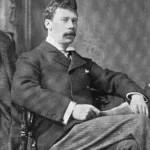 | |
Frozen Margit | |
| Author | Arthur Quiller-Couch |
|---|---|
| Published |
1899
|
| Language | English |
| Nationality | British |
| Genre | Editing, Literary Criticism |
1899 Short Story
Frozen Margit
Frozen Margit is an English Editing, Literary Criticism short story by British writer Arthur Quiller-Couch. It was first published in 1899.
Frozen Margit
by Arthur Quiller-Couch
A Narrative of the sufferings of Mr. Obed Lanyon, of Vellingey-Saint Agnes, Cornwall; Margit Lanyon, his wife; and seventeen persons (mostly Americans) shipwrecked among the Quinaiult Tribes of the N.W. Coast of America, in the winter of 1807-8. With some remarkable Experiences of the said Margit Lanyon, formerly Pedersen. Written by the Survivor, Edom Lanyon, sometime a Commander in the service of the Honourable East India Company.
My twin brother Obed and I were born on the 21st of March, 1759 (he being the elder by a few minutes), at Vellingey-St. Agnes, or St. Ann’s, a farm on the north coast of Cornwall, owned and cultivated by our father Renatus Lanyon. Our mother was a Falmouth woman, daughter of a ship’s captain of that port: and I suppose it was this inclined us to a sea-faring life. At any rate, soon after our fifteenth birthday we sailed (rather against our father’s wish) on a short coasting voyage with our grandfather–whose name was William Dustow.
A second voyage in the early summer of 1776 took us as far as the Thames. It happened that the famous Captain Cook was just then recruiting for his third and (as it proved) his last voyage of discovery. This set us talking and planning, and the end was that we stole ashore and offered ourselves. Obed had the luck to be picked. Though very like in face, I was already the taller by two inches; and no doubt the Captain judged I had outgrown my strength. But it surprised me to be rejected when Obed was taken; and disappointed me more: for, letting alone the prospect of the voyage, we two (as twins, and our parents’ only children) were fond of each other out of the common degree, and had never thought to be separated.
To speak first of Obed:–Captain Cook put some questions, and finding that we were under our grandfather’s care, would do nothing without his consent. We returned to the ship and confessed to the old man, who pretended to be much annoyed. But next day he put on his best clothes and went in search of the great seaman, to Whitehall; and so the matter was arranged. Obed sailed in July on board the Discovery; shared the dangers of that voyage, in which the ships followed up the N.W. Coast of America and pushed into Behring’s Strait beyond the 70th parallel; was a witness, on February 4th, 1779, of his commander’s tragical end; and returned to England in October, 1780. Eleven years later he made another voyage to the same N.W. American Coast; this time as master’s mate under Vancouver, who had kept an interest in him since they sailed together under Cook, and thought highly of him as a practical navigator and draughtsman. It was my brother who, under Vancouver, drew up the first chart of the Straits of Fuca, which Cook had missed: and I have been told (by a Mr. G–, a clerk to the Admiralty) that on his return he stood well for a lieutenant’s commission–the rule of the Service being stretched now and then to favour these circumnavigating seamen, many of whom worked their way aft from the hawse-hole to the quarter deck. But my father and mother dying just then, and the former having slipped a particular request into his will, Obed threw up the sea and settled down in Vellingey as a quiet yeoman farmer.
Meanwhile, in 1779, I had entered the sea service of the Honourable East India Company; and with passable good fortune had risen in it pretty fast. Enough to say, that by the spring of 1796 I was looking forward to the command of a ship. Just then my fortune deserted me. In a sudden fear of French invasion, our Government bought the four new ships which the Company had building (and a bad bargain they proved). This put a stop for the time to all chance of promotion; and a sharp attack of jaundice falling on top of my disappointments, I took the usual decrease of pay and the Board’s promise to remember my services on a proper occasion, and hauled ashore to Vellingey for a holiday and a thorough refit of health.
I believe that the eight or nine following months which Obed and I spent together were the happiest in our two lives. He was glad enough to shoulder off the small business of the farm and turn–as I have seen so many men play, in a manner, at the professions they have given over–to his favourite amusement of sounding the coast of Vellingey and correcting the printed charts. He kept a small lugger mainly for this purpose, and plied her so briskly that he promised to know the sea-bottom between Kelsey Head and Godrevy Rock better than his own fields. As for me, after years of salt water and stumping decks, I asked nothing better than to steer a plough and smell broken soil, and drowse after supper in an armchair, with good tobacco and Obed for company.
In this way we passed the winter of 1796-7; until the lambing season, which fell midway in February. The year opened wet, with fresh south westerly winds, which in the second week chopped suddenly; and for four days a continuous freezing gale blew on us from the N.W. It was then that the lambs began to drop; and for three nights I exchanged pipe and fireside for a lantern and the lower corner of Friar’s Parc at the back of the towans, where the ewes were gathered in the lew.[1] They kept us so busy that for forty-eight hours we neither changed our clothes (at least, I did not) nor sat down to a meal. The sand about Vellingey is always driving, more or less; and the gale so mixed it up with fine snow that we made our journeys to and from the house, so to speak, blindfold, and took our chance of the drifts. But the evening of the 11th promised better. The wind dropped, and in an hour fell to a flat calm: then, after another hour, began to draw easily off shore–the draught itself being less noticeable than the way in which it smoothed down the heavy sea running. Though the cold did not lift, the weather grew tolerable once more: and each time I crossed the townplace[2] with a lamb in my arms, I heard the surf running lower and lower in the porth below Vellingey.
By day-break (the 12th) it was fallen to nothing: the sky still holding snow, but sky and sea the same colour; a heavy blueish grey, like steel. I was coming over the towans, just then, with a lamb under either arm (making twelve, that night) when I happened to look seaward, and there saw a boat tossing, about a gunshot from the shore.
She was a long boat, painted white; very low in the sheer, and curved at stem and stern like a Norwegian; her stem rounded off without a transom, and scarcely bluffer than her bows. She carried a mast, stepped right forward; but no sail. She was full of people. I counted five sitting, all white with snow–one by the mast, three amidships, and one in the stern sheets, steering. At least, he had a hand on the tiller: but the people had given over pulling, and the boat without steerage-way was drifting broadside-on towards the shore with the set of the tide.
While I stood conning her, up at the house the back-door opened, and my brother stepped out and across the yard to milk the cows. His milk-pails struck against the door-post, and sounded as clear as bells. I shouted to him and pointed towards the boat: and after looking a moment, he set down his pails and started off at a run, down towards the porth. I then hurried towards the house, where I found Selina, our old housekeeper, in the kitchen, tending the lambs with warm milk. Handing the new-comers over to her, I caught up a line and made off hot-foot after Obed.
At low-water (and the tide had now scarcely an hour to ebb) the sands in Vellingey Porth measure a good half-mile from the footbridge at its head to the sea at its base. My legs were longer than Obed’s; but I dare say he had arrived five minutes ahead of me. He was standing and calling to the boat’s crew to get out an oar and pull her head-to-sea: for although the smoothing wind had taken most of the danger out of the breakers, they were quite able to capsize and roll over any boat that beached herself in that lubberly fashion.
I ran up panting, and shouted with him–“Pull her round head-to-sea, and back her in!”
Not a man moved or lifted a hand. The next moment, a wave tilted and ran a dozen yards with her, but mercifully passed before it broke. A smaller one curved on the back-draught and splashed in over her gunwale as she took ground. But what knocked the wind out of our sails was this–As the first wave canted her up, two men had rolled out of her like logs; and the others, sitting like logs, had never so much as stirred to help!
“Good Lord!” I called out, and fumbled with my line. “What’s the meaning of it?”
“The meaning is,” said Obed, “they’re dead men, every mother’s son. They’re frozen,” said he: “I’ve seen frozen seamen before now.”
“I’ll have in the boat, anyway,” I said. “Here, catch hold and pay out!” Running in, I reached her just as she lifted again; and managed to slew her nose in-shore, but not in time to prevent half-a-hogshead pouring over her quarter. This wave knocked her broadside-on again, and the water shipped made her heavier to handle. But by whipping my end of the line round the thwart in which her mast was stepped, for Obed to haul upon, and myself heaving at her bows, we fetched her partly round as she lifted again, and ran her into the second line of breakers, which were pretty well harmless.
“How many on board?” Obed sang out.
“Five!” called I, having counted them. Up to this I had had enough to do with the boat; besides looking after myself. For twice the heave had tilled me up to the armpits, and once lifted me clean off my feet; and I had no wish to try swimming in my sea-boots. “Five,” said I; “and two overboard–that makes seven. Come and look here!”
“Tend to the boat first,” he said. “I’ve seen frozen seamen.”
“You never saw the likes of this,” I answered. So he ran in beside me.
The boat had her name (or that of the ship she belonged to) painted in yellow and black on the gunwale strake by her port quarter– “MARGIT PEDERSEN, BERGEN”: but by their faces we could not miss knowing to what country the poor creatures belonged. They were–
1. A tall man, under middle age; seated by the mast and leaning against it (his right arm frozen to it, in fact, from the elbow up) with his back towards the bows. The snow was heaped on his head and shoulders like a double cape. This one had no hair on his face; and his complexion being very fresh and pink, and his eyes wide open, it was hard to believe him dead. Indeed, while getting in the boat, I had to speak to him twice, to make sure.
2. A much older man, and shorter, with a rough grey beard. He sat in the stern sheets, with his right hand frozen on the tiller. Our folk had afterwards to unship the tiller when they came to lift him out: and carried him up to the house still holding it. Later on we buried it beside him. This man wore a good blue coat and black breeches; and at first we took him to be the captain. He turned out to be the mate, Knud Lote, who had put on his best clothes when it came to leaving the ship. His eyes were screwed up, and the brine had frozen over them, like a glaze, or a big pair of spectacles.
3. Against his knee rested the head of a third man–one of the three I had first seen sitting amidships. When the other two toppled overboard this one had slid off the thwart and fallen against the steersman. He was an oldish man, yellow and thin and marked with the small-pox; the only one in the boat who might have come from some other country than Norway. His eyes were cast down in a quiet way, and he seemed to be smiling. He wore a seaman’s loose frock, ragged breeches, and sea-boots.
4 and 5. Stretched along the bottom-boards lay a tall young man with straw-coloured hair and beard: and in his arms, tightly clasped, and wrapped in a shawl and seaman’s jacket, a young woman. Her arms were about the young man and her face pressed close and hidden against his side. He must have taken off his jacket to warm her; for the upper part of his body had no covering but a flannel shirt and cinglet.
While we stood there the tide drained back, leaving the bows of the boat high and dry. As I remember, Obed was the first to speak; and he said “She has beautiful hair.” This was the bare truth: a great lock of it lay along the bottom-board like a stream of guineas poured out of a sack. He climbed into the boat and lifted the shawl from her face.
Those neighbours of ours, friends and acquaintances, who afterwards saw Margit Pedersen at Vellingey, and for whom this account is mainly written, will not need a description of her. Many disliked her: but nobody denied that she was a lovely woman; and I am certain that nobody could see her face and afterwards forget it. It was, then and always, very pale: but this had nothing to do with ill health. In fact I am not sure it would have been noticeable but for the warm colour of her hair and her red lips and (especially) her eyebrows and lashes, of a deep brown that seemed almost black. Her lips were blue with the cold, just now: but the contrast between her eyebrows and her pale face and yellow hair struck me at once and kept me wondering: until Obed startled me by dropping the shawl and falling on his knees beside her. “Good God, Dom!” he sang out: “the girl’s alive!”
The next moment, of course, I was as wild as he. “Get her out, then,” I cried, “and up to the house at once!”
“I can’t loosen the man’s arms!” Though less than a yard apart, we both shouted at the top of our voices.
“Nonsense!” I answered: but it was true all the same–as I found out when I stepped in to Obed’s help. “We must carry up the pair as they are,” I said. “There’s no time to lose.”
We lifted them out, and making a chair of our hands and wrists, carried them up to Vellingey; leaving the others in the boat, now for an hour well above reach of the tide. And here I must tell of something that happened on the way: the first sign of Obed’s madness, as I may call it. All of a sudden he stopped and panted, from the weight of our load, I supposed. “Dom,” he said, “I believe that nine men out of ten would kiss her!”
I told him not to be a fool, and we walked on. In the town-place we happened on the shepherd, Reuben Santo, and sent him off for help, and to look after the frozen people in the boat. The sight of us at the door nearly scared Selina into her grave: but we allowed her no time for hysterics. We laid the pair on a blanket before the open fire, and very soon Obed was trying to force some warm milk and brandy between the girl’s lips. I think she swallowed a little: but the first time she opened her eyes was when one of the lambs (which everyone had neglected for twenty minutes or so) tottered across the kitchen on his foolish legs and began to nuzzle at her face. Obed at the moment was trying to disengage the dead man’s arms. A thought struck Selina at once. “Put the lamb close against her heart,” she said. “That’ll warm her more than any fire.”
So we did, making the lamb lie down close beside her; and it had a wonderful effect. In less than half-an-hour her pulse grew moderately firm and she had even contrived to speak a word or two, but in Norwegian, which none of us understood. Obed by this time had loosened the dead man’s arms; and we thought it best to get her upstairs to bed before the full sense of her misfortune should afflict her. Obed carried her up to the spare-room and there left her to Selina; while I saddled horse and rode in to Truro, for Doctor Mitchell.
Much of what followed is matter of public knowledge. Our folks carried the dead Norwegians up to Church-town, including one of the two that had fallen overboard (the next tide washed him in; the other never came to land); and there buried them, two days later, in separate graves, but all close together. The boat being worthless, we sawed it in two just abaft the mast and set the fore-part over the centre grave, which was that of Captain Pedersen, the young man we had carried up with Margit. The mast rotted and fell, some years ago, although carefully stayed: but the boat, with the names painted on it, remains to this day. Also we set up a small wooden cross by each man’s grave, with his name upon it. Margit was able, from our description, to plan out the right name for each.
On the third day an interpreter came over from Penzance. Margit could not yet leave her bed: and before he stepped up to question her, I took him aside and showed a small Norwegian Bible we had found in the pocket of the seaman’s jacket to which she owed her life. On the first page was some foreign writing which I could not make out. The interpreter translated it: first the names “Margit Hansen to Nils Pedersen”: and after them, this strange verse from the Song of Solomon–strange, I mean, to find written in such a place–“Let him kiss me with the kisses of his mouth: for thy love is better than wine.”
The interpreter, Mr. Scammel, went upstairs, and she told him her story. “Our vessel,” she said (I give it in brief) “was the Margit Pedersen, brig. She belonged to me and was called after me. We were bound for the Tagus with a cargo of salted fish which I had bought at Bergen from the Lofoden smacks–fish for the Roman Catholics to eat in Lent. Nils Pedersen, the captain, was my husband: Knud Lote was mate.” Mr. Scammell having expressed some surprise that so young a man should have been captain, she explained, “He was twenty-two. I made him captain. My father and mother died: they had not wished me to marry him. They were proud. But they left very little money, considering; and with it I bought the brig and cargo. She was an old craft, half rotten. We had fair weather, mostly, down the English Channel and almost to Ushant. There we met a strong southerly gale, and in the middle of it a pintle of our rudder gave way and the loose rudder damaged our stern-post. We tried to bear up for Falmouth, but she would not steer; and we drove up towards the Irish Coast, just missing Scilly. On the 8th the wind changed to N.W. and increased. That night, as Nils tried to lay to, she carried away her fore-mast, which had been shaky for days. She was now leaking fast. At noon on the 9th we managed to launch a boat, and abandoned her. She sank at four o’clock: we saw her go down. The weather grew colder, that night. I think it snowed all the time: and the seas were too heavy to let the boat run. The men pulled to keep her nose to them and the wind, and so she drifted. I forget when they gave over pulling. For a night and a day I baled steadily. After that I lay most of the time in the bottom of the boat. Our food was almost done. It was very cold. That is all I can remember.”
And this, I think, was all we ever heard from her. On his return to Penzance, Mr. Scammell sent me a Norwegian dictionary; and with the help of it Obed and I soon managed to talk a little with her, in a mixture of Norwegian and English. But she never wanted to speak of the past, and fell silent whenever we spoke of it. What astonished me more was that, though she told us the names of the dead men, she showed no further interest in them. At first, knowing how weak she was, and fearing to distress her, I fought shy of the subject; but one day, towards the end of the third week–she being strong enough to walk a moderate distance– I plucked up courage and asked if she cared to come with me to the churchyard. She agreed, and that afternoon, after a heavy shower, we walked thither together. I feared what effect the first sight of her husband’s grave might work on her feelings; and all the way kept wishing that we had omitted to set up the boat and mast. But she looked at them calmly, and at the graves. “That is good,” she said: “you have done great kindness to them. I will not come any more.” And so she prepared to walk away.
I own that this seemed to me unfeeling. Outside the churchyard I pulled from my pocket the small Bible. “This belongs to you,” I said: “I have kept it to help me with your language”–but I held it open at the fly-leaf. She glanced at it, “Oh yes, I gave it to Nils, my husband. You wish to keep it?”
“You were very fond of him, to judge from this,” I said; and halted, expecting her to be angry. But she halted too, and said quite coolly– looking at me straight–“Yes? Oh yes; very much.”
That same evening I spoke to Obed as we sat alone with our pipes. “I suppose,” said I as carelessly as I could, “Margit Pedersen will be leaving us before long.” He looked up sharply, and began to shift the logs on the hearth. “What makes you say so?” he asked. “Well, she will have friends in Bergen, and business–” “Has she written to her friends?” he interrupted. “Not to my knowledge: but she won’t be staying here for ever, I suppose.” “When she chooses to go, she can. Are you proposing to turn her out? If so, I’d have you to mind that Vellingey is my house, and I am master here.”
This was an unworthy thing to say, and he said it with a fury that surprised me. Obed and I had not quarrelled since we were boys. I put a stopper on my tongue, and went on smoking: and after a while he began to talk again in his natural way on ordinary matters.
Margit stayed on; and to all appearance our life at Vellingey fell back into its old groove. As a matter of fact there was all the difference in the world–a difference felt before it was seen, and not to be summed up by saying that a woman sat at our table. I believe I may quite fairly lay the blame on Obed. For the first time in our lives he kept a part of his mind hidden from me; he made show enough of frankness in his talk, but I knew him far too well to miss the suspicion behind it. And his suspicion bred suspicion in me. Yet though I searched, I could find nothing amiss in his outward bearing. If he were indeed in love with the girl–her age, she told us, was twenty-one–he gave no sign upon which one could lay hold. And certainly Margit’s bearing towards us was cool and friendly and impartial as the strictest could desire. Of the two, I had, perhaps, more of her company, simply because Obed spent most of his time in the lugger, while I worked in the fields and within easy reach of an afternoon’s stroll. Margit would be busy with housework most of the morning, or in the kitchen, helping Selina–“domineering,” Selina preferred to call it.
For, whatever our feelings, Selina had set her face against the new-comer from the first. She started, no doubt, with the old woman’s whiddle that no good ever comes of a person saved from the sea. But as time went on she picked up plenty of other reasons for dislike. Margit took charge from the day she came downstairs, and had a cold way of seeing that her orders were attended to. With about twenty words of English she at once gave battle to Selina, who had bullied us two men from childhood; and routed her. The old woman kept up a running fight for a week before appealing to Obed, and this delay cost her everything. Obed flew in a rage that more than equalled her own, and had the advantage to be unusual and quite unexpected by her. She ran from him to the kitchen, in tears; and thenceforth was a beaten woman, however much she might grumble at the “foreigner” and “interloper.”
For me, I will confess, and have done with it, that before a month was out my interest in this pale foreign woman, who moved about the house so quietly and surely, had grown to a degree that troubled me. That Obed had suspected me before he had any cause made it no easier now to play a concealed game at cross-purposes; and no pleasanter. In the two months that followed I hated myself pretty often, and at times came near to despise myself for the thought that before long I might be hating Obed. This would never have done: and luckily I saw it in time. Towards the end of June I made application to the Board: and left Vellingey in July, to sail for Bombay on board the Warren Hastings, in my old capacity of first mate. My abandoning the field to Obed would deserve some credit, had Margit ever by word or look given me the slightest reason to hope. But she had not; indeed I hoped that she had never guessed the state of my feelings.
Eighteen months passed before I returned to Vellingey–this time on a short leave. Obed had written constantly and with all the old familiarity; a good deal concerning Margit–her health, her walks, her household business–everything, in short, but what I expected and dreaded to hear. “Come,” I said to myself, “five minutes’ start in life and eighteen months in courtship is no such bad allowance for Obed. Perhaps he will allow me now to have my turn.”
I had this thought in my head as I drew near Vellingey in a light gig hired from the Truro post-master. It was a rainy afternoon in January, and a boisterous north-wester blew the Atlantic weather in our teeth as we mounted the rise over Vellingey churchtown. My head being bent down, I did not observe the figure of a woman coming up the village street, but looked up on hearing the sound of her clogs close beside the gig. It was Selina, tearful, carrying a bundle.
“Whatever is the matter?” I asked, on pulling up.
“They’ve turned me to door!” she moaned. “My dear, they’ve turned me to door!”
She was tramping home to her cousins in St. Day parish. Not another night would she sleep at Vellingey–to be trampled on. Of course she accused the “foreign woman “: but I, it seemed, had started the quarrel this time; or, rather, it started over the preparations for my home-coming–some trifling matter of cookery. Selina knew my tastes. Margit professed to know them better. Such are women.
I own that as I sent the poor soul on her way, with a promise that the gig should carry back her boxes from Vellingey and a secret resolve that she should return to us within a week, I could not avoid a foolish pleasure in the thought that Margit deemed my coming of such importance. Then it occurred to me that her position now as a single woman alone at Vellingey lay open to scandal. The sooner I tested my growing hopes, the better.
I did so, the second evening, after supper. Obed had stepped out to make the round of the farm buildings and lock up. Margit had removed the white cloth, and was setting the brass candlesticks and tobacco jar on the uncovered table.
“What is going to happen about Selina?” I asked, from my chair.
Margit set down a candlestick. “Selina has gone,” she said quietly.
“But people will talk, if you stay here alone with us, or with Obed. You mustn’t mind my saying this.”
“Oh, no. I suppose they will talk.”
I stood up. “I take it,” said I, “you cannot be quite blind to my feelings, Margit. I came home on purpose to speak to you: but perhaps, if it had not been for this, I might have put off speaking for some days. If you care for me at all, though, I think you can answer. My dear, if you will marry me it will make me a happy man.”
She was fingering the candle-base, just touching the brass with her finger-tips and withdrawing them gently. She looked up. “I rather thought,” she said, “you would have spoken last night. Obed asked me this morning–he gave you that chance: and I have promised to marry him.”
“Good Lord! but this is a question of loving a man!”
“I have never said that I like you better. I shall make Obed a very good wife.”
Less than a minute later, Obed came into the room, after slamming the back-door loudly. He did not look at our faces: but I am sure that he knew exactly what had happened.
They were married in April, a fortnight after my leaving England on another voyage. We parted the best of friends; and in the course of the next seven years I spent most of my holidays with them. No married life could well be smoother than was Obed’s and Margit’s in all this time. He worshipped her to fondness; and she, without the least parade of affection, seemed to make his comfort and well-being the business of her life. It hardly needs to be said that my unfortunate proposal was ignored by all of us as a thing that had never happened.
In October, 1802, I reached the height of my ambition, being appointed to the command of the Company’s ship Macartney, engaged in the China traffic. I call her the Macartney: but the reader will presently see that I have reasons for not wishing to make public the actual name of this vessel, which, however, will be sufficiently familiar to all who knew me at that time and who have therefore what I may call a private interest in this narrative. For the same reason I shall say no more of her than that she was a new ship, Thames-built, and more than commonly fast; and that I commanded her from October 1802 to June 1806.
She carried passengers, of course: and in the autumn of 1805 it surprised and delighted me to hear from Obed that he and Margit had determined on a sea voyage, and wished to book their passages to the Canton River and back in the Macartney. I had often given this invitation in jest: but such voyages merely for health and pleasure were then far from common. Yet there was no single impediment to their going. They had no children: they were well-to-do: they had now a hind, or steward (one Stephens), to whose care they might comfortably leave the farm. To be short, they sailed with me.
On the 2nd of May 1806, the Macartney dropped anchor in the Canton River after a fast and prosperous voyage. The events I have now to relate will appear least extraordinary to the reader who best understands under what conditions the English carry on their trade with China. Let me say, then, that in its jealousy of us foreign barbarians the Chinese government confines our ships to the one port of Canton and reserves the right of nominating such persons as shall be permitted to trade with us. These Hong merchants (in number less than a dozen) are each and all responsible to the Emperor for any disturbance that may be committed by a person belonging to a foreign ship: and they in turn look for compensation to the European factors. So that, a Chinese mob being the most insolent in the world, and the spirit of British seamen proverbial, these factors often find themselves in situations of great delicacy, and sometimes of more than a little danger.
It happened that on the next day after our arrival a small party of us– Margit and Obed, the second officer, Mr. Tomlinson, and I–had taken a short stroll ashore and were returning to the boat, which lay ready by the landing, manned by six seamen. The coxswain brought the boat alongside: and I, on the lowest step of the landing-stage, stooped to hold her steady while Margit embarked. She and Obed waited on the step next above, with Mr. Tomlinson close behind. A small crowd had followed us: and just then one dirty Chinaman reached forward and with a word or two (no doubt indecent) laid his open palm on the back of Margit’s neck. Quick as thought, she lifted a hand and dealt him a rousing box in the ear. I sprang up and pushed him back as he recovered. He slipped on the green ooze of the steps and fell: this was all I saw, for the crowd made a rush and closed. Obed and Mr. Tomlinson had hurried Margit into the boat: I leapt after them: and we pushed off under a brisk shower of dirt and stones. We were soon out of range, and reached the ship without mishap.
Knowing the nature of a Chinese rabble, I felt glad enough that the affair had proved no worse; and thought little more of it until early next morning, when Mr. Findlater, the first officer, came with a puzzled face and reported that during the night someone had attached a boat, with a dead Chinaman in it, to the chain of our small bower anchor.
I went on deck at once. A good look at the corpse relieved me: for as far as my recollection served, it bore no resemblance to the man I had pushed on the landing. I told off two of the rowers of the previous day–the two whose position in the bows had given them the best view of the scuffle–to cut the thing adrift. They did so and came back with the report that they had never seen the dead man before in their lives. So I tried to feel easy.
But soon after breakfast, and almost in the full heat of the day, there came off a galley with two of the Hong merchants and no less a person than Mr. ‘–‘, the Chief of the H.E.I.C.’s fa







